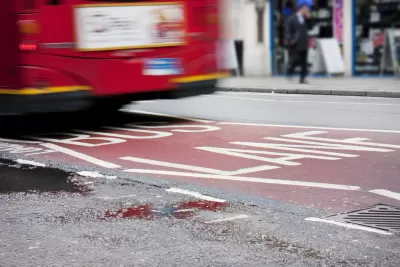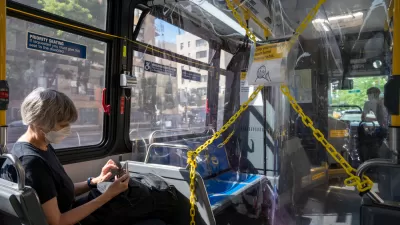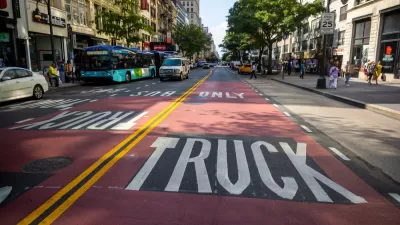As cities streamline approval processes for bus-only lanes during the pandemic, transit experts hope the projects will lead to lasting change.

In a discussion hosted by TransitCenter on the efficacy of bus lanes installed during the COVID-19 pandemic, transportation professionals weighed in on the need for continued and improved bus service and the effects of the pandemic on transit systems across the country.
The pandemic only highlighted existing inequities in transit systems. While trains tend to serve white-collar workers who have largely shifted to working from home, buses remain a crucial lifeline for essential workers, many of whom are low-income and depend on buses to access jobs. During the pandemic, train ridership in Chicago dropped by 80%, while bus ridership stayed essentially the same.
To take advantage of lighter traffic and improve the efficiency of bus systems, some cities have fast-tracked bus lane projects this year, with Boston adding 14 miles of bus lanes in 2020. By reducing barriers to bus lane projects and implementing quick, temporary solutions, cities can improve traffic in the short term and gain support for making bus lanes permanent in the future as travel picks back up and users see the benefits of more efficient transit service.
FULL STORY: How have pandemic bus lanes worked out in Chicago, Boston, and SF?

Maui's Vacation Rental Debate Turns Ugly
Verbal attacks, misinformation campaigns and fistfights plague a high-stakes debate to convert thousands of vacation rentals into long-term housing.

Planetizen Federal Action Tracker
A weekly monitor of how Trump’s orders and actions are impacting planners and planning in America.

In Urban Planning, AI Prompting Could be the New Design Thinking
Creativity has long been key to great urban design. What if we see AI as our new creative partner?

Researchers Use AI to Get Clearer Picture of US Housing
Analysts are using artificial intelligence to supercharge their research by allowing them to comb through data faster. Though these AI tools can be error prone, they save time and housing researchers are optimistic about the future.

Making Shared Micromobility More Inclusive
Cities and shared mobility system operators can do more to include people with disabilities in planning and operations, per a new report.

Car Designs Make it Harder to See Pedestrians
Blind spots created by thicker pillars built to withstand rollover crashes are creating dangerous conditions for people outside vehicles.
Urban Design for Planners 1: Software Tools
This six-course series explores essential urban design concepts using open source software and equips planners with the tools they need to participate fully in the urban design process.
Planning for Universal Design
Learn the tools for implementing Universal Design in planning regulations.
Appalachian Highlands Housing Partners
Gallatin County Department of Planning & Community Development
Heyer Gruel & Associates PA
Mpact (founded as Rail~Volution)
City of Camden Redevelopment Agency
City of Astoria
City of Portland
City of Laramie





























